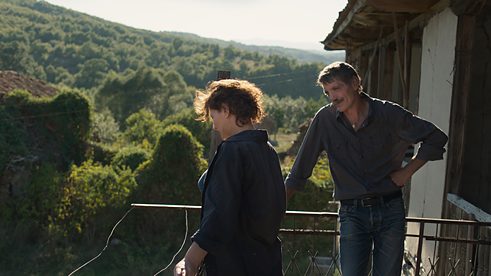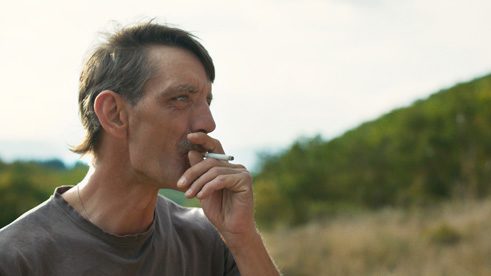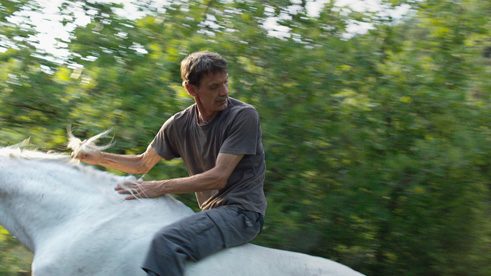MIFF 2017
Western: Earning its genre and title

The western genre was built upon outsiders never quite fitting in; on moral codes enforced, defended and challenged; on conflict over places and spaces; on hard, sparse land that mirrors the emotional turmoil of those who walk upon it. By naming her film Western, writer/director Valeska Grisebach expertly conjures images of each before her first frames hit the cinema screen. And, while the sound and vision that comprise the feature transport all of the above to the Bulgarian border — following German workers nonetheless — they also dissect just what the genre means today.
Contemporary cinema may be deep into a phase of emphasising western-like aspects in everything from horror to action movies, and fashioning revisionist takes as well; however, at the heart of this fascination sits the timelessness of the genre’s core elements. The lure of strong, silent types trying to do what’s right will never subside, and nor will the tussle for territory, as current world politics continues to demonstrate. Grisebach is overt in her use of many oater hallmarks, including the inclusion of a pivotal grey horse and the prominence of her remote setting, but she needn’t be. In relaying an account of laborer imports making their presence known as they install a water power facility, the western’s classic locals-versus-transplants dynamic is immediately apparent.
 There’s a timeless quality to much of Western’s details: the ego-driven competition, the frontier-like landscape, and the clash of insiders and interlopers
| © Western
If the German filmmaker’s long-awaited follow-up to 2006’s Longing Western has a lone hero poised to make an impact amidst such seething climes, its ex-legionnaire Meinhard (Meinhard Neuman), who says little and relies on others just as infrequently. In keeping with genre convention, he’s also the catalyst for much of the discord that follows, even if he’s not always its direct source. Arrogant site foreman Vincent (Reinhardt Wetrek) is immediately cautious, especially when Meinhard keeps his distance from the camp’s macho posturing, literal flag-waving and boorish treatment of women. Instead, the newcomer would rather befriend village head honcho Adrian (Syuleyman Alilov Letifov), borrow his steed for a ride and soak in the countryside.
There’s a timeless quality to much of Western’s details: the ego-driven competition, the frontier-like landscape, and the clash of insiders and interlopers
| © Western
If the German filmmaker’s long-awaited follow-up to 2006’s Longing Western has a lone hero poised to make an impact amidst such seething climes, its ex-legionnaire Meinhard (Meinhard Neuman), who says little and relies on others just as infrequently. In keeping with genre convention, he’s also the catalyst for much of the discord that follows, even if he’s not always its direct source. Arrogant site foreman Vincent (Reinhardt Wetrek) is immediately cautious, especially when Meinhard keeps his distance from the camp’s macho posturing, literal flag-waving and boorish treatment of women. Instead, the newcomer would rather befriend village head honcho Adrian (Syuleyman Alilov Letifov), borrow his steed for a ride and soak in the countryside.
Cowboy-like problems with modern packaging
Unsurprisingly, this isn’t a scenario where respecting differences — of demeanour, opinion, motivation and more — is commonplace, with perceived and actual slights soon provoking a heated working and living environment. Testosterone flares up in intimate quarters and vast surroundings, offering cowboy-like problems with modern packaging, and casting an eye over interpersonal battles with an astute awareness for their intricacies reminiscent of Maren Ade’s Toni Erdmann (the former is a producer here, while Grisebach was a script consultant on the latter). Indeed, Western shows an affinity for documenting masculine behaviour in all its guises, contrasting the stoic with the petty, the world-wearied with the eager to carve out a niche, and the set-in-stone with the malleable. Each has graced many a feature involving the western genre’s two John’s (Ford and Wayne); here, they resound in a situation that feels like the old made new again. By naming her film Western, writer/director Valeska Grisebach expertly conjures images of each before her first frames hit the cinema screen
| © Western
There’s a timeless quality to much of Western’s details, of course: the ego-driven competition, the frontier-like landscape, and the clash of insiders and interlopers, for example. The smart but simple contextualisation of film’s premise within an increasingly fractious Europe couldn’t make a stronger statement about its contemporary relevance, however, bristling as it is with observations about the echoes of history, the recent cultural and economic climate of the continent, and traditions being threatened. Accordingly, like oaters of old, Grisebach’s feature can be enjoyed for its genre trademarks as much as its societal commentary, though it’s the combination of the two — and the naturalism they’re conveyed with, in everything from the movie’s unflashy yet still lyrical lensing to its authentic performance from non-actors — that cements its western credentials. A feature by any other moniker would’ve proved as quietly powerful, but this one more than earns its genre and title.
By naming her film Western, writer/director Valeska Grisebach expertly conjures images of each before her first frames hit the cinema screen
| © Western
There’s a timeless quality to much of Western’s details, of course: the ego-driven competition, the frontier-like landscape, and the clash of insiders and interlopers, for example. The smart but simple contextualisation of film’s premise within an increasingly fractious Europe couldn’t make a stronger statement about its contemporary relevance, however, bristling as it is with observations about the echoes of history, the recent cultural and economic climate of the continent, and traditions being threatened. Accordingly, like oaters of old, Grisebach’s feature can be enjoyed for its genre trademarks as much as its societal commentary, though it’s the combination of the two — and the naturalism they’re conveyed with, in everything from the movie’s unflashy yet still lyrical lensing to its authentic performance from non-actors — that cements its western credentials. A feature by any other moniker would’ve proved as quietly powerful, but this one more than earns its genre and title.